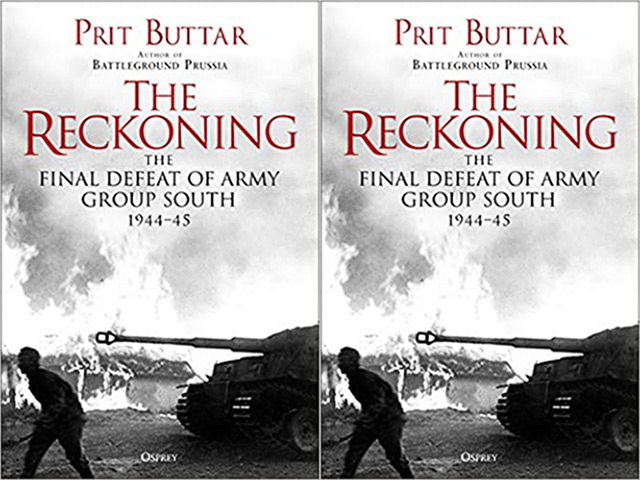The Reckoning – The Defeat of Army Group South, 1944
Book review

The Reckoning – The Defeat of Army Group South, 1944, Prit Buttar, Osprey Publishing, 2020, £30, 496 pages, ISBN HB 978-1-4728-3791-2
This is the ninth of Prit Buttar’s non-fiction books about conflict on Germany’s Eastern Front in the First and Second World wars, several of which Trevor James and I have reviewed for The Historian. It follows a well worn, but extremely successful, format in which he explains the wider strategic issues but also examines the detailed experiences of individuals and small tactical groups to give an understanding, as well as one ever can, of what it felt like to be there.
The author is a British GP with five years’ experience as an Army doctor, and he attributes his first major history, Battleground Prussia, to the reminiscences of a patient, who had been a nurse in East Prussia in World War Two and had narrowly escaped capture by the Russians.
One of the Hitler’s main purposes during Operation Barbarossa in 1941 had been to take the Ukraine, which he felt would allow Germany to feed itself and not be starved into submission as he believed had happened in the First World War. He also needed Romanian oil and these two tasks were allocated to Army Group South. They proved to be too much in 1941 but it had penetrated as far as Stalingrad (now Volgograd) at the junction of the Volga and the Don by August 1942. The epic Russian defence of that city lasted until February 1943 and the rest of the year saw the both sides manoeuvring for position, with the Germans mostly on the back foot. It was during this period that the Battle of Kursk was fought with Army Group South operating on the southern edge of the Kursk salient.
However, it was not until 1944 that the Russian forces facing Army Group South really ‘learnt how to win’ and that is the subject of this book. The change required re-armament, retraining and a new mental approach by commanders at all levels; similar to the British Army ‘learning curve’ in the First World War. Buttar charts this change and shows that the Red Army was not some vast monolith sweeping westwards but a carefully controlled organisation with an overall plan, yet still capable of responding to the German genius for counter-attack even when everything appeared to be lost.
This was not a battleground that paid heed to the Geneva Convention. The German Army had committed many brutal acts as it moved eastwards, stripping the land of industry and people, and the Russians behaved with even greater ferocity as the reclaimed their own territory, took much of Eastern Europe and moved towards the German borders. Some of the tales in the book turn the stomach but they are a necessary background to the conflict.
All in all this is an engrossing book at every level.

